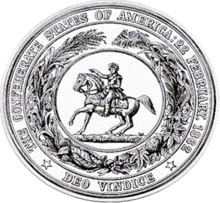Joseph Shepherd Wyon
Joseph Shepherd Wyon (1836–1873) was an English medallist and seal-engraver.
Life
Born on 28 July 1836, he was the eldest son of Benjamin Wyon. He was educated by his father, and studied in the schools of the Royal Academy, where he gained two silver medals.[1]
On 2 December 1858 Wyon was appointed Chief Engraver of the Seals, a post previously held by his father and grandfather. He died at Winchester on 12 August 1873.[1]
Works

Wyon's first important work was a medal of James Watt. On Robert Stephenson's recommendation, it was adopted as the prize medal of the Institution of Civil Engineers.[1]
In his work as a medallist, Wyon was aided by his brothers Alfred Benjamin Wyon and Allan Wyon. The medals are often signed "J. S. and A. B. Wyon". They included:[1]

- 1861, Steevens's Hospital medals, Dublin (Cusack prize);
- 1863, entry of Princess Alexandra into London;
- 1846–65, New Zealand war medal;
- 1867, confederation of provinces of Canada;
- the great seal of the dominion of Canada;
- reception of the sultan of Turkey in London;
- 1867–8, Abyssinian war medal; and
- 1872, Prince of Wales's recovery.
Wyon also engraved the Great Seal of the Confederate States of America.[2]
Notes
- ↑ 1.0 1.1 1.2 1.3
 Lee, Sidney, ed. (1900). "Wyon, Joseph Shepherd". Dictionary of National Biography 63. London: Smith, Elder & Co.
Lee, Sidney, ed. (1900). "Wyon, Joseph Shepherd". Dictionary of National Biography 63. London: Smith, Elder & Co. - ↑ Historical Notes, The South Carolina Historical and Genealogical Magazine Vol. 9, No. 2 (Apr., 1908), pp. 102-103. Published by: South Carolina Historical Society. Stable URL: http://www.jstor.org/stable/27575191
- Attribution
![]() This article incorporates text from a publication now in the public domain: Lee, Sidney, ed. (1900). "Wyon, Joseph Shepherd". Dictionary of National Biography 63. London: Smith, Elder & Co.
This article incorporates text from a publication now in the public domain: Lee, Sidney, ed. (1900). "Wyon, Joseph Shepherd". Dictionary of National Biography 63. London: Smith, Elder & Co.